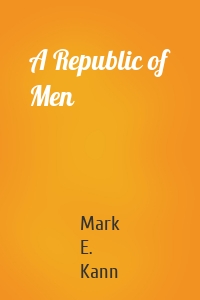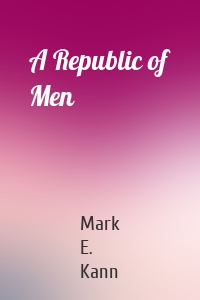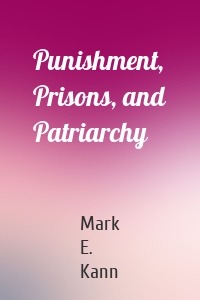Mark E. Kann
4 кн.
A Republic of Men
What role did manhood play in early American Politics? In A Republic of Men , Mark E. Kann argues that the American founders aspired to create a «republic of men» but feared that «disorderly men» threatened its birth, health, and longevity. Kann demonstrates how hegemonic norms of manhood–exemplified by «the Family Man,» for instance–were deployed as a means of stigmatizing unworthy men, rewarding responsible men with citizenship, and empowering exceptional men with positions of leadership and...
| Автор | Mark E. Kann |
A Republic of Men
What role did manhood play in early American Politics? In A Republic of Men , Mark E. Kann argues that the American founders aspired to create a «republic of men» but feared that «disorderly men» threatened its birth, health, and longevity. Kann demonstrates how hegemonic norms of manhood–exemplified by «the Family Man,» for instance–were deployed as a means of stigmatizing unworthy men, rewarding responsible men with citizenship, and empowering exceptional men with positions of leadership and...
| Автор | Mark E. Kann |
Taming Passion for the Public Good
“Kann's latest tour de force explores the ambivalence, during the founding of our nation, about whether political freedom should augur sexual freedom. Tracing the roots of patriarchal sexual repression back to revolutionary America, Kann asks highly contemporary questions about the boundaries between public and private life, suggesting, provocatively, that political and sexual freedom should go hand in hand. This is a must-read for those interested in the interwining of politics,...
| Автор | Mark E. Kann |
Punishment, Prisons, and Patriarchy
Punishment, Prisons, and Patriarchy tells the story of how first-generation Americans coupled their legacy of liberty with a penal philosophy that promoted patriarchy, especially for marginal Americans. American patriots fought a revolution in the name of liberty. Their victory celebrations barely ended before leaders expressed fears that immigrants, African Americans, women, and the lower classes were prone to vice, disorder, and crime. This spurred a generation of penal reformers to promote...
| Автор | Mark E. Kann |





